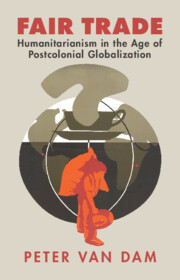
- Coming soon
- Publisher:
- Cambridge University Press
- Expected online publication date:
- May 2025
- Print publication year:
- 2025
- Online ISBN:
- 9781009586283
- Subjects:
- History, Global History, Economic History

The fair trade movement has been one of the most enduring and successful civic initiatives to come out of the 1960s. In the first transnational history of the movement, Peter van Dam charts its ascendance and highlights how activists attempted to transform the global market in the aftermath of decolonization. Through original archival research into the trade of handicrafts, sugar, paper, coffee and clothes, van Dam demonstrates how the everyday, material aspects of fair trade activism connected the international politics of decolonization with the daily realities of people across the globe. He explores the different scales at which activists operated and the instruments they employed in the pursuit of more equitable economic relations between the global South and North. Through careful analysis of a now ubiquitous global movement, van Dam provides a vital new lens through which to view the history of humanitarianism in the age of postcolonial globalization.
‘These days ‘fair trade’ evokes associations of product labels and certification schemes. In his book Fair Trade: Humanitarianism in the Age of Postcolonial Globalization, Peter van Dam offers a rich historical account of the transnational fair trade movement. He shows how certification was only one of many strategies discussed by activists to make global trade relations more just. The movement was much more diverse than present-day associations might suggest and contestation about the goals and means of fair trade a constant in its history.’
Liesbeth van de Grift - Utrecht University
‘Peter van Dam's book is a must-read for anyone interested in global social movements, humanitarianism and post-colonialism. The meticulously researched book shows that fair trade movements and decolonization have been siblings since the 1950's. In troubled times, Peter van Dam encourages us to think about the role of hope in local activism, about alternative economies in global capitalism and about the attempts to diminish social inequalities. Although the movement failed to achieve the latter, the local lens provides us with historical examples of global relations, political struggles and international solidarity that will be indispensable as the climate crisis progresses.’
Sandra Maß - Ruhr-Universität Bochum
‘This groundbreaking and elegantly written study on the fair trade movement is a real tread. By positioning his protagonists between local activism and the emergence of a global humanitarian ‘market place’, Peter van Dam has written a book, that will soon become a standard reference for historians in the field.’
Daniel Roger Maul - University of Oslo
‘Fair trade has been an amazingly resilient idea, and Peter van Dam brilliantly analyzes how that rallying cry has evolved since the 1950s. His history offers many provocative insights into the activism born of globalization.’
Adam Rome - University at Buffalo
‘This exploration of how principled but practical people have evolved and negotiated Fair Trade principles and material practices is a timely reminder of the intricate connections between Fair Trade and social movements at multiple levels, indeed its roots in transnational collaboration and advocacy for economic justice.’
Anne Tallontire - University of Leeds
Usage data cannot currently be displayed.